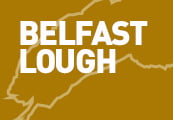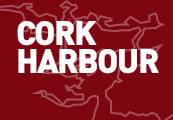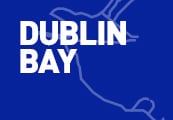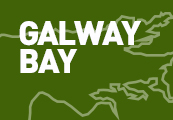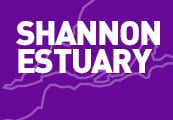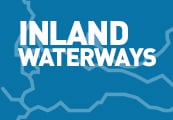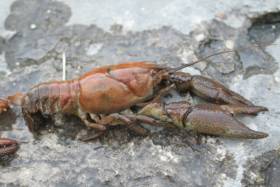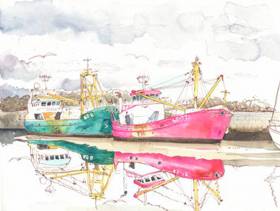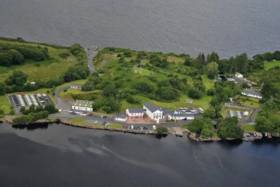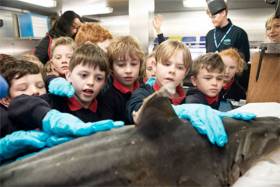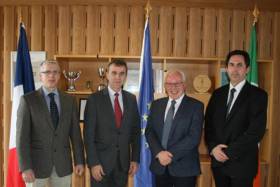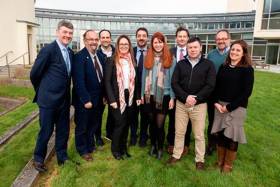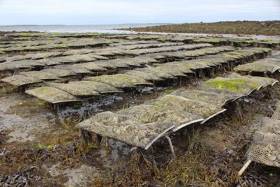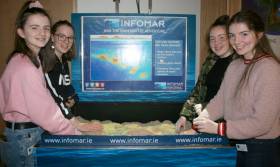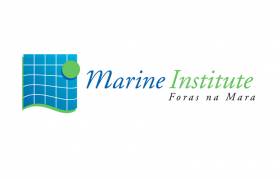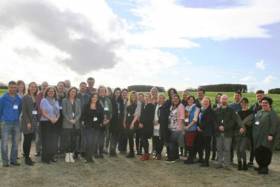Displaying items by tag: Marine Institute
Galway Hosts Irish Crayfish Seminar Next Month
The Marine Institute in Oranmore, Co Galway will host an Irish Crayfish Seminar on Tuesday 21 and Wednesday 22 May in response to recent outbreaks of crayfish plague in Ireland’s waterways.
A series of talks by invited speakers from across Ireland and Europe will cover many aspects of crayfish ecology and what is known about the disease.
The latest international and national research findings will be presented on the broad topics of:
- Irish crayfish in national, all Ireland and European contexts.
- Ecology of white-clawed crayfish in Ireland.
- Crayfish plague: What is it? How did it get here? What can we do about it?
- Crayfish plague in Europe: What can we learn from the European experience?
- Biosecurity: its importance and practical advice on safe, clean working.
The event is free but booking is essential. Resigter online before 5pm on Monday 13 May.
An outline of the two-day seminar with confirmed speakers is available to read or download HERE.
Capturing The Importance Of The Ocean For Irish & Welsh Coastal Communities Through Art
A series of watercolour illustrations and interviews have captured the importance of the ocean to coastal communities in Ireland and Wales as part of the EU-funded BlueFish Project.
Sharon Sugrue, scientific and technical officer at the Marine Institute, and Galway’s urban sketcher Róisín Curé visited coastal communities in Ireland and Wales that border the Irish and Celtic Seas.
They met with people from a broad spectrum of marine activities including fishing, aquaculture, leisure, transport, tourism and marine renewable energy.
“A key aspect of the project was speaking with people living and working in coastal communities, and gathering their opinions about climate change and learning about how it might affect their livelihoods,” Sugrue said.
“Along with interviewing people and documenting their daily interactions with the sea, the medium of art was also used to record their activities. This was a unique opportunity to talk directly to coastal communities and capture their perspectives through art.”
Róisin Curé produced a series of watercolour illustrations that captured snapshots of these coastal communities and people’s daily lives.
The results of the interviews and art, through watercolour illustrations, created an accessible way for the public to understand the importance the ocean has on livelihoods in coastal communities.
By engaging with people and industries dependant on the sea, the information gathered highlighted how they benefit from the ocean, their thoughts on climate change, and particularly how it was going to affect their lives and businesses.
Comments made by fishermen stated that without the ocean, they wouldn’t have a living, as it’s their only source of income in their rural parts of Ireland.
“Many of the stories reaffirmed the importance of the age-old relationship between people and the sea, noting that the sea is the life-blood which sustains these communities,” Sugrue said.
“The general consensus in both Ireland and Wales coastal communities was that climate change is happening. There was an acknowledgment and a realisation amongst the people interviewed that there was a real looming threat to their livelihoods.”
Many people commented on how they were seeing changes to their climate in their local communications. A local businessman from Anglesey said: “In the 38 years I’ve been working here, the road would have flooded twice a year. Now it floods much more often.”
Curé said: “I felt privileged to sketch, at close quarters, people whose ingenuity has turned a potentially hostile ocean into a source of income. I hope that the same ingenuity will provide the answers to the challenges we’re facing with the effects of climate change.”
In August 2018, the ports of Dingle in Co Kerry, Baltimore in Co Cork, Kilmore Quay in Co Wexford and Howth in Co Dublin were visited and fishermen, restaurateurs, shellfish producers, operators in the tourism sector and seafarers were interviewed.
The Welsh coastal communities were visited in October and included Anglesey, Bangor, Pwllheli, New Quay, Milford Haven and Pembrokeshire.
Sugrue added: “This project has given me the opportunity to engage with those living and working in coastal communities in a personal and hands on way.
“Growing up by the sea and being part of a family business in aquaculture, I felt an affinity with the people interviewed. It also brought home to me the effect that climate change could have in a ‘real sense’ showing how these effects could ripple through these communities.”
Linking science and art as a mechanism to convey the importance of the ocean to coastal communities and the potential impacts of climate change on these communities will continue throughout 2019, where the project will feature at maritime festivals in Ireland and Wales and continue the dialogue with these coastal communities.
The BlueFish Project is a partnership between six organisations in Ireland and Wales including the Marine Institute, University College Cork, Bord Iascaigh Mhara, Bangor University, Aberystwyth University and Swansea University.
The marine science research project is funded by the Ireland Wales 2014-2020 European Territorial Co-operation (ETC) Programme. The purpose of this maritime programme is to connect organisations, businesses and communities on the West coast of Wales with the South- East coast of Ireland.
Through engagement with coastal communities and art, the BlueFish Project, launched in September 2017, aims to develop knowledge and understanding of the marine resources and the potential impacts of climate change on the Irish and Celtic Sea ecosystem.
To find out more about the BlueFish Project, visit BlueFishProject.com
Marine Institute’s Newport Base Open To The Public This Sunday
The Marine Institute’s research facility in Newport, Co Mayo will open its doors to primary school children this week and to the general public for an open day this Sunday 14 April from 11am to 4pm.
Primary pupils from Newport, Kilmeena, Carrowaholly, Glenhest, Knockroosky and Snugboro schools in Co Mayo will visit the Newport Catchment Facility on today and tomorrow (Wednesday 10 and Thursday 11 April) to speak with marine scientists and view the freshwater hatchery and fish rearing facilities on site.
A number of PhD candidates will also be available to talk to students about their subject choices and potential careers in the marine sector.
Beavers and cubs from the Westport and Ballyhaunis Scout groups will have an opportunity to tour the facility this Saturday 13 April.
And the open day at Newport Catchment Facility thus Sunday offers an opportunity for visitors to view the facilities in the Burrishoole Valley and learn more about the research taking place at the site.
A range of cutting-edge research is undertaken at the Newport Catchment Facility including genetics work across several species of salmon, sea bass, pollock and bluefin tuna, as well as research on catchment ecosystems events, climate change, oceanography and aquaculture.
Marine Institute chief executive Dr Peter Heffernan said: “We welcome visitors to our Newport facility to see the work that is being undertaken by scientists and postdoctoral students that not only contributes to national research, but also has international relevance.
“Our open day is also an opportunity to engage the public and increase awareness of the value and opportunities of our marine resource, a goal of Ireland’s marine plan Harnessing Our Ocean Wealth.”
Children from Rang 2 at Scoil Shéamais Naofa in Bearna got up close and personal with sharks on the RV Celtic Explorer as part of the Marine Institute’s outreach and engagement programme.
The pupils completed a project module on sharks in Irish waters as part of the Marine Institute’s Explorers Education Programme, and also had the opportunity to visit the State research vessel.
Outreach officer Padraic Creedon of the Explorers Education Programme said one if the programme’s unique elements “is the content and support provided to teachers in the classroom in an easy and fun way.
“The students were inspired by the discovery of a rare shark nursery 200 miles off the west coast of Ireland in 2018, and we were delighted to create lessons, interactive experiments and discussion about the ocean, sharks and their environment for the class.”
While on board the RV Celtic Explorer, pupils met with the captain and scientists and saw what it might be like to work on a research vessel.
Students spoke with Captain Denis Ronan about the Celtic Explorer, and learn more about the acoustically silent ship that can stay out at sea for up to 35 days.
The pupils were excited to tour the vessel and speak with marine scientists to discover more about shark species, seabed mapping, shipwrecks and the marine environment.
Visiting the dry and wet labs, the pupils saw various fish species from recent surveys and shark species, such as dogfish and the tope shark.
Clár Ní Bhraonáin, teacher at Scoil Shéamais Naofa, said: “It has been an amazing experience … Students don’t forget days like this.”
The Explorers programme offers a range of materials including lesson plans to conduct experiments in class, watching films that helps generate discussion, and peer learning among pupils.
“Because of the students’ enthusiasm to learn more about sharks, we have been able to incorporate marine themes across the curriculum, where they have excelled and produced some incredible work, from writing books about sharks to a series of posters and artwork,” Ní Bhraonáin added.
“This project has really helped myself and the students learn more about the ocean.”
For more information on the Explorers Education outreach centres, visit the Explorers Contacts page at Explorers.ie. The programme is supported by the Marine Institute and is funded under the Marine Research Programme by the Government.
French Ambassador Visits Marine Institute To Learn About Its Work & Future Strategies
The Marine Institute recently welcomed the Ambassador of France in Ireland, Stephane Crouzat, and Attaché for Science and Technology Marc Daumas to its headquarters in Oranmore.
The French delegation received a tour of the Marine Institute facility, and met with staff to gain an insight into the work of the institute and collaborations with French organisations.
Welcoming the delegation to the Marine Institute, Dr Paul Connolly, director of fisheries and advisory services, said: “We were delighted to have the opportunity to exchange knowledge and discuss our recent work and research with the ambassador.
“Our collaborations with French scientists and the French institute Ifremer and important relationships which also increase our research capacity.”
The ambassador was greeted by Dr Connolly and Thomas Furey of the INFOMAR programme, and introduced to the broad work of the institute using the various displays in the reception area.
Dr Connolly outlined the work of the institute’s marine science research vessels, and the design for a new state-of-the-art marine research vessel for Ireland which is now under way.
The ambassador also viewed a series of artworks and watercolour illustrations produced as part of BlueFish marine science project, which links art and science to demystify the concept of climate change in coastal communities.
Furey demonstrated how the INFOMAR Augmented Reality Sandbox is used to explain the concept of seabed mapping to children and adults at public events.
Experts from the Marine Institute shared their involvement in recent research and projects through a number of presentations.
Jennifer Doyle explained how underwater TV surveys assess nephrops stocks and how the Marine Institute has transferred this technology to the Bay of Biscay, by working closely with the French Institute Ifremer.
Furey discussed INFOMAR’s work and links with several French organisations, Guillaume Ball outlined his current research on tuna, and Yves Reecht explained how mobile phone technology was being used to build a system to map the fishing activity of small inshore vessels.
Aodhán Fitzgerald provided an overview on the Marine Institute’s role as co-ordinators of EuroFleetsPlus, a project which will access to an advanced research fleet and involve a number of French partners.
Dr Margaret Rae also presented the work undertaken by the Atlantic Ocean Research Alliance (AORA) as part of the transatlantic alliance between the USA, Canada and the European Union.
The French delegation also received an overview of Ireland’s Integrated marine plan Harnessing Our Ocean Wealth, and the Marine Institute’s Strategic Plan 2018 – 2022 Building Ocean Knowledge, Delivering Ocean Services.
A key building block in developing the institute’s digital capability as part of this strategic plan was achieved last month when it became one of the first 10 national data centres worldwide to receive the international accreditation of its Data Management Quality Management Framework by the (UNESCO) International Oceanographic Commission's IODE programme.
The IODE (International Oceanographic Data and Information Exchange) programme designates national oceanographic data centres and has a central co-ordinating role internationally.
New digital capabilities are critical to integrated marine service delivery including areas such as oceanographic services, food safety, fisheries and marine management programmes, the institute says, adding that the IODE accreditation “will underpin the quality of these services and underlines the Marine Institute's commitment to high-quality services”.
These services include the institute’s Digital Ocean programme which is developing new digital capabilities in data management, integration, analytics and modelling to contribute to making high-quality marine data and information more readily available to support service delivery to Government, the national marine research and innovation community, the public and to facilitate international collaboration.
#MarineScience - The EurofleetPlus Kick-off meeting held at the Marine Institute in Galway this past week (Tuesday 5 to Thursday 7 March) announced details of the project that will facilitate access to the largest advanced marine science research vessel fleet across Europe, Greenland, USA and Canada, Bermuda and New Zealand.
Building on the achievements of the two preceding Eurofleets projects, the Marine Institute is a co-ordinator of EurofleetsPlus, a consortium comprising 42 marine institutes, universities, foundations and SMEs from 24 countries across Europe, North America and Oceania, with funding of €9.9 million.
Welcoming Ireland’s leadership role in this major EU Horizon 2020-funded project, Marine Minister Michael Creed said: “This recognises the high standards of scientific and operational excellence which continue to be achieved by the Marine Institute and is particularly relevant in the strategically important arena of research vessels operations, where the Marine Institute’s RV Celtic Explorer operates over 300 days of the year.
“Ireland’s participation in international research partnerships such as EurofleetsPlus adds value to Ireland’s ocean research capacity and I congratulate the Marine Institute on its outstanding success rate of 40% in Horizon 2020 funding bids totalling €6.6 million since 2014.”
Involving trans-national activities, the project will prioritise research on sustainable, clean and healthy oceans, linking with existing ocean observation infrastructures, as well as support innovative ideas working closely with industry.
Aodhán Fitzgerald, RV operations manager at the Marine Institute and EurofleetsPlus project co-ordinator, said that the project will enable access to an unprecedented number of vessels providing a significant increase in ship time at sea.
“With a fleet of 27 state-of-the-art research vessels from European and other international partners, this is extremely exciting for marine researchers as they now have opportunities to access research vessels in the North Atlantic, Mediterranean, Black Sea, North Sea, Baltic Sea, Pacific Southern Ocean and Ross Sea, through the competitive calls process.”
In addition to ship time, marine researchers and scientists will also have the opportunity to work with the best marine equipment and marine infrastructure exploring the ocean in ways that have not been possible in the past.
This will include access to seven new remotely operated vehicles (ROVs) to capture video and samples from the deepest parts of the ocean. The researchers will have access to five autonomous underwater vehicles for collecting data relating to the ocean environment.
In addition, a unique mobile portable telepresence unit will also enable remote access by researchers and diverse end users including the public, which is a first for Europe.
Establishing a strategic roadmap and sustainability plan, EurofleetsPlus will extend and enhance the capabilities of the European research vessel infrastructure, bringing new perspectives, new ideas, and new research and innovation tracks that will be beneficial to all.
At the kick-off meeting, Fitzgerald added: “I am looking forward to working with established and new partners over the next four years. This trans-national project will provide us all with a unique opportunity to develop our networking activities, ensure robust call processes with booking ship-time, as well as increase our stakeholder engagement at a national and international level.”
EurofleetsPlus is funded under Horizon 2020 Integrating Activity for Advanced Communities with respect to Environmental and Earth Sciences - Research Vessels. The project has received funding from the European Union's Horizon 2020 research and innovation programme under grant agreement No 824077.
Oyster Farming Industry & Researchers Meet To Discuss Latest Knowledge On Oyster Health
The latest research and knowledge on oyster diseases was presented at a meeting on Pacific oyster health held recently by the Marine Institute’s Fish Health Unit.
The event attracted more than 80 participants from Ireland’s oyster farming industry, as well as representatives from Ireland’s seafood development agency Bord Iascaigh Mhara.
Presentations focused on mortality, disease management and current national and international research in oyster health.
Oyster mortalities in recent years in Ireland have been mainly associated with either Ostreid herpes virus-1 μVar (OsHV-1 μVar) infection or the bacterium Vibrio aestuarianus. Both diseases cause significant oyster mortality events and an economic loss to oyster farmers and producers.
Researchers from the Marine Institute and University College Cork presented the major findings from the REPOSUS project, funded by the Department of Agriculture, Food and the Marine’s FIRM programme.
The three-year REPOSUS project focused on reducing the impact of pathogens associated with mortalities in Pacific oysters. This included results from sentinel trials in disease impacted bays, molecular and pathogenicity characterisation studies on isolates of OsHV-1 and rache and studies on environmental parameters which influence mortality.
French institute IFREMER also presented the latest results from the VIVALDI project (Preventing and Migrating Farmed Bivalve Diseases) funded by the EU’s Horizon 2020 research and innovation programme.
VIVALDI combines European research resources to better understand shellfish diseases and improve the sustainability and competitiveness of the European shellfish industry. The Marine Institute is one of 21 partners involved in this research project.
Industry representatives from Ireland also shared their experience of managing losses in shellfish production due to oyster disease and mortality on their sites.
This feedback, along with research presented, will be used to update the current best practice guide for disease control and management in Ireland's oyster industry.
TY Students Dive Into Science At Marine Institute’s HQ
Last week the Marine Institute’s headquarters in Oranmore, Co Galway welcomed 22 Transition year students to its fifth annual TY training week.
Students from Galway, Mayo, Clare, Roscommon, Dublin and Waterford engaged in a range of STEM-related activities to experience what it is like to work in the marine sector.
The TY students shadowed scientists and staff at the Marine Institute, learning about marine science, technology and asasociated disciplines.
They also engaged in a range of presentations and interactive activities related to fisheries science, marine chemistry, seabed mapping, food safety, research vessel operations, maritime development, oceanography and marine climate, data, applications development, team-building and communications.
“Increasing students’ knowledge on the importance of our marine resource, is key to supporting Ireland's ocean economy, where highly skilled professionals are needed in the future,” said Marine Institute chief executive Dr Peter Heffernan.
“Our TY Week programme aims to inspire a new generation of marine professionals, and provides an insight into the diverse career opportunities on offer in Ireland’s marine sector.”
TY students from any school in Ireland are welcome to apply for this week-long, full-time work experience opportunity at the Marine Institute for 2020. Further details on the application process will be available later this year.
Seven renewable energy projects are benefitting from a significant funding injection following investment by the Marine Institute’s industry-led awards, as reported last month on Afloat.ie.
With the aim of driving innovation in the marine sector and accelerating renewable energy breakthroughs, funding of up to €200,000 was awarded to each of the research projects to be conducted by indigenous companies, with some including university partners.
Speaking at the funding announcement, Marine Institute chief executive Dr Peter Heffernan said: “The diversity of renewable energy projects benefiting from this funding demonstrates the innovation and expertise that we are developing in Ireland in this sector.
“From research on the impact of floating platform technology to subsea micro-piling to hybrid solar and wind energy devices, the commercial opportunities of these projects are very exciting. We are committed to supporting marine enterprises in Ireland to drive Ireland's blue economy.”
Gavin & Doherty GeoSolutions is being awarded €199,957 over two years for their research project in partnership with University College Cork that will involve a geological, geotechnical, sediment and morphodynamic assessment of designated areas of the Irish seabed.
Predictive sediment transport modelling, validated against field data, will be used to characterise future seabed changes and to quantify the risk for future potential offshore wind developments in the Irish sea.
The outcomes of the project will support developers in efficient design, installation and maintenance planning of offshore renewable assets and will reduce the risk associated with future wind farm developments in the Irish Sea.
Two projects in the area of floating energy platforms were also successful in their research funding applications.
Solar Marine Energy will receive €195,465 over two years, in partnership with UCC, to progress how solar energy can be harnessed on a floating platform to power an electrolysis unit to produce Hydrogen in an electro-fuel form while using battery storage for the release of power as and when required.
Solar Marine Energy Ltd (SME) is one of the first companies to design, engineer and manufacture cost-competitive floating solar energy products in its Floating Solar Panels, in accordance with maritime industry best practice.
To make floating wind a commercial reality, further technology innovation is necessary. The Eureka-Sea Wind project proposed by Marine Materials Ireland Ltd (MMI) will also receive €199,816 over two years to develop reliable and efficient floating wind turbine technology based on a novel concept that reduces cost and weight.
Based in Ireland and the USA, Resolute Marine Ltd has developed a successful Oscillating Wave Surge Converter (OWSC) flap system.
Now with a funding boost of €199,955, Resolute Marine will bring the OWSC from concept to robust design that is optimised for locations in the developing countries and islands targeted for commercial installations of RML’s innovative wave-powered desalination systems.
This project is set to advance the Irish wave energy industry and provide jobs for three additional highly trained experts in the fields of hydrodynamics, ocean engineering and project management.
Subsea Micropiles is being awarded €199,902 for research on the design and temporary installation of two demonstration micropile anchors.
The anchor frames will represent structures that would support the foundations of offshore wind turbines or hydrokinetic energy converters. The two anchors will be load tested both horizontally and vertically and the results compared with design predictions.
This type of micropiling technology for subsea environment provides a real and cost-effective alternative to current subsea micropiling models.
Use of robotically installed micropiles in the subsea environment represents important innovation and potential cost saving for marine renewable energy projects.
Fish farmers are actively searching for renewable energy sources to replace the diesel consumption, which causes concerns in relation to emissions and increases risk of oil spills when transporting diesel to the feed aquaculture barges.
Wind and solar generation on fish farm cages currently do not meet the power needs and can be fundamentally challenging and particularly high maintenance, when mounted so close to the ocean itself.
Wave energy, especially when coupled with the existing mooring system, is seen as a very appealing solution.
Exceedence and TfI Marine secured €199,532 in funding to research and develop a revolutionary 1kW Inline Gator system. The Inline Gator will harness the natural power of the waves by converting the motion of the fish cage into electricity thereby mitigating the need for fossil fuels.
W1DA Experience Ltd is also being awarded €198,763 in funding for the Marine EcoPowa Project in partnership with the University of Southampton and UCC.
The project aims to create a new generation of medium power (12-15KW/20-30HP) environmentally–friendly marine propulsion and energy regeneration systems that will replace what is currently termed as “outboard motors”.
The potential financial benefits to boat users in Ireland are significant, potentially costing less than half that of petrol and diesel motors over a 10-year lifetime.
The Marine Institute says it is committed to assisting industry-led development through knowledge transfer, capacity building and research to enable optimal decision making and planning to best leverage Ireland’s natural marine resources sustainably and efficiently.
This investment in marine enterprises is a key output of the Marine Institute Strategic Plan 2018-2022: Building Ocean Knowledge, Delivering Ocean Services, guided by the Government’s integrated marine plan Harnessing Our Ocean Wealth as well as the National Marine Research and Innovation Strategy 2017–2021.
Increased economic growth and job creation from small and medium-sized enterprises based in Ireland is a key component of several national strategies and regional development plans. Funding for these seven renewable research projects is being provided by the Marine Institute and the Government, co-funded under the European Regional Development Fund (ERDF).
Irish Ocean Literacy Network Meeting Shapes The Conversation About Our Oceans & Human Health
The Irish Ocean Literacy Network held its sixth national meeting last Wednesday 20 February at the Marine Institute in Galway, where keynote speakers Dr Easkey Britton — surfer and post doc fellow at NUI Galway — and filmmaker Ken O’Sullivan of Sea Fever Productions spoke about the importance the ocean has on our lives as islanders.
Speaking at the event as chair, Cushla Dromgool-Regan of the Marine Institute welcomed having two distinguished guest speakers, highlighting the importance of recognising Ireland’s rich maritime heritage and being able to share our stories.
“As an island nation we are extremely lucky to have a wealth of experts from all walks of life willing to share their experiences with the wider marine community,” she said.
“From being able to see a whale and its calf close up in Irish waters through Ken’s film work, to watching children learning to surf for the first time with Easkey, reminds us of the diversity and importance of our maritime heritage and looking after our ocean for future generations.”
Easkey Briton is widely recognised for her international achievements in surfing is currently completing a post-doctoral research fellow with the EU-Horizon 2020 project Seas, Oceans and Public Health in Europe (SOPHIE).
Growing up in a family of surfers, Easkey talked about how her life passion for the water has brought her in a full cycle, where much of her research as a social scientist has been about the environment and society.
“Bringing people together through community outreach to working with a range of stakeholders in my current research highlights how we all value the ocean in different ways, yet together we all seem to understand the importance of linking our ocean with human health,” Easkey said.
Filmmaker Ken O’Sullivan also spoke at the event sharing his love of the ocean. Coming from a family of fishermen and then learning to dive opened up a new world of discovery for Ken at a young age, where he stated “exploring the ocean as a child with no limitations was like living the life to what might be similar to Huckleberry Finn. Now making a career out of filming wildlife and creative documentaries in the most extreme environments has been a life of adventures.”
Ken O’Sullivan set up Sea Fever Productions in 2006 with Katrina Costello to produce wildlife and creative documentaries. In 2018 they produced Ireland’s Deep Atlantic, a hugely ambitious ocean natural history series searching for blue whales and cold water coral reefs in the deep waters of the North Atlantic, documenting habitats and whale and shark behaviour for the first time ever.
“I have worked with a range of people who have contact with the ocean from fishermen, whale watchers to marine researchers and scientists during their deep sea expeditions, [and] coupled with the development of filming technology, [it] has provided an incredible opportunity to capture footage of marine life right at our doorstep,” Ken said.
“The feedback from the public who have seen my work has been extremely rewarding, particularly from those who are seeing marine life in Irish waters for the first time.”
With a wide range of ocean champions promoting ocean engagement across the island of Ireland, the Irish Ocean Literacy Network says it has seen a significant growth in the last six months, with nearly 100 members representing individuals, small businesses, outreach and education specialists, researchers, NGOs, State agencies and Government departments throughout Ireland.
Garry Kendellen, secretariat of the network, said: “With the recent growth of the IOLN membership, it is encouraging see a sense of the ocean community in one room.
“Our network is a truly eclectic mix of people, who share a similar passion for the ocean. From community outreach to larger national collaborations, it is great to see so many members willing to share their experiences with the network, providing advice and inspiring new collaborations and ideas.”
During the strategic workshop run by David Murphy of AquaTT, he noted: “As an island nation we are in a unique position to help contribute to the national and international efforts to increase peoples understanding and engagement about the ocean.
“We are all individuals who bring something new to the network, yet working together as a collective highlights the importance of creating impactful actions and messaging promoting our ocean from coast to coast.”
The Irish Ocean Literacy Network holds four membership meetings per year where attendees are able to meet other ocean champions who are keen to raise awareness and engagement about the ocean in Ireland. Membership is currently free and if you are interested in learning more, contact [email protected].
The Marine Institute are funders of the Irish Ocean Literacy Network secretariat, which was awarded to Galway Atlantaquaria from 2018-2020. This aims to supports the institute’s Strategic Plan 2018-2022, Building Ocean Knowledge – Delivering Ocean Services, as well as the Government’s marine strategy Harnessing Our Ocean Wealth, whereby it aims to increase awareness of the value, opportunities and societal benefits of our ocean, as well as raising peoples engagement with the ocean.

